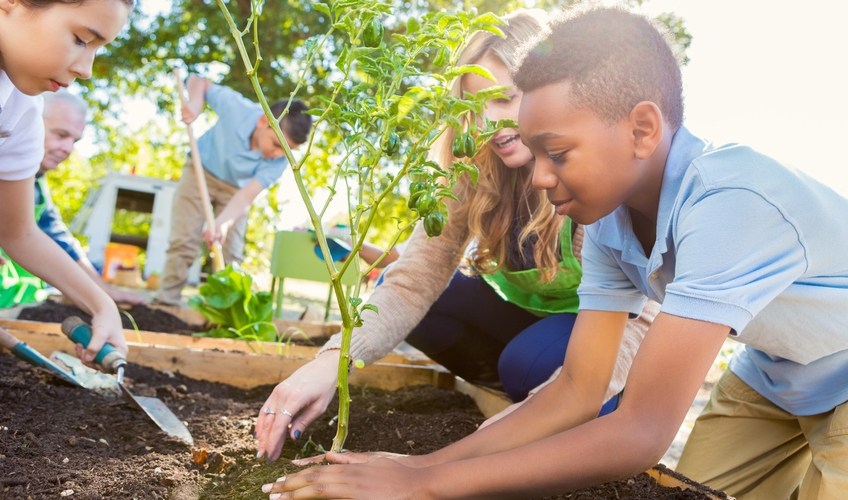Several years ago the charity that helps to improve school grounds, Learning through Landscapes launched Fruit-full schools. This project is about getting thousands of young people across England planting heritage fruit orchards within their school grounds with the help of people from the local community. It works on all levels; social, ecological and economic. Firstly the school children engage with the local community, including the elderly who have a great deal of knowledge and experience to share. The ecological benefits are apparent in the merry hum that surrounds the trees at Timothy’s school; bees, wasps and other insects are enjoying the rich windfall pickings to be had. The fruits that are grown within the grounds make a cheap and nutritious addition to the school’s meal plan with regular treats such as baked apples, crumbles and pies, as well as an apple at break for the first few weeks of the school term.
Two thirds of England’s orchards have been lost since the 1950’s and this scheme aims to reverse this trend. Fruitfull Schools is a four year scheme, run in partnership with Common Ground, the UK champion for local distinctiveness, and Garden Organic, experts in organic fruit tree production. An army of apple volunteers has been drafted to research local varieties, graft 2,000 new trees and establish sustainable orchards in 200 schools across the country. Long before the development of Fruitfull Schools, Alvanley Church of England Primary School set up an orchard in its grounds in the middle of the village. The communal orchard began in 1989 with local apple varieties; today pears, plums, greengage, medlars and mulberries flourish there. Members of the local community are encouraged to visit the orchard as often as they like outside of school hours. In the classroom, the orchard provides fodder, covering studies from home economics to science lessons in which pupils record the wildlife within the orchard area.
Community Involvement
Many schools are looking at ways to encourage pupils to become more ecologically aware and the most inspiring of these seem to be within the school grounds. This year the Royal Horticultural Society (RHS) launched a nationwide initiative that brings teachers, pupils and local adults outside to develop school gardens. As part of the RHS Campaign for School Gardening, ‘Get Your Grownups Growing’ will run this October, with primary schools across the country planning gardening events at which parents, grandparents and other adults can get involved.
Graham Johnson at Neasdon Primary School in Hull, took part in a ‘Get Your Grown-ups Growing’ pilot scheme last year: “When we first got involved, all we had was a bare patch of unused ground. With the support and the resources provided by the RHS and the time and effort put in by parents, grandparents and other locals we’ve been able to build a greenhouse and several bat boxes.”
Enhanced Wellbeing
Over the last twelve months the school has come up with some great ideas and started implementing them. “We are now growing our own wheat and barley and the children are really excited about tasting bread made using ingredients from their own garden,” he continues. “It’s a useful tool for introducing children to healthy eating and teaching them about where their food comes from.” Being outdoors and growing their own food seems to have a noticable effect on pupils sense of wellbeing and confidence. Gordon Seabright of the RHS, says: “Teachers tell us that gardening brings out the best in children, socially, emotionally and physically. It introduces them to growing their own food, caring for wildlife and learning outside the classroom.” Mike Morley, a grandfather in his 70s, is involved in the scheme and is delighted with the progress that they have made. “I visit my granddaughter’s school, Neadsen Primary a couple of times a week and spend about four hours helping to look after the garden. We’ve planted all sorts of vegetables and fruit trees and now we’ve got strawberries, leeks, potatoes and pears. I first saw the garden during an event held at the school and thought it was something I’d like to help out with. A few hours a week isn’t that much. It’s impressive how gardening projects really get the attention of all the children, I help them water the plants, take cuttings and plant seeds.” For Mike, the future looks brighter for his granddaughter since taking part in the scheme at school. “The real benefit I think is that my granddaughter knows what all the different kinds of vegetables and fruit look like and where they come from. When she’s older she’ll know how to grow these things and hopefully mean that she’ll make healthy choices when it comes to food.”
Edible Playground
Meanwhile in London, Rotherfield primary school in Islington has recently launched a new ‘edible playground’ with the charity Trees for Cities. An austere corner of the playground has been transformed into an inviting fruit and vegetable garden. The playground was made up of asphalt surfaces and brick walls with a wire fence separating it from the road. There were very few green surfaces, plants or evidence of nature for children to interact with and learn about so the charity was called in to help the school realize the vision.
Trees for Cities has been transforming asphalt spaces into outdoor learning spaces across the city, incorporating fruit and nut trees as well as herb and more traditional vegetable beds which provide fresh organic produce for children to take home. This is part of the Trees for Food movement, designed to reintroduce foodproducing trees to urban areas. Sharon Johnson of Trees for Cities explains, “Food is travelling further than ever before, often thousands of miles from where it was produced. For local areas this means a loss of traditional varieties of fruit and vegetable, and character. Globally it contributes to pollution and damage to the environment.“
Urban Growth
Sharon is a woman on a mission, with a drive to change the face of our urban areas and make them more pleasant, vibrant places to be. “With fruit and nut trees being eradicated from schools and public spaces there has been an increasing sterilisation of our urban environment,” she continues. “Trees for Cities aims to help reverse this trend by reintroducing native food-producing trees to the city landscape. Vegetable gardens and outdoor classrooms like these, engage children with nature and show them how rewarding it is to spend time outdoors, and they ably demonstrate where food comes from.“
Poultry Plans
Some schools have taken the concept of green grounds further and added livestock. At Portland School in Sunderland, a special school for pupils with profound learning difficulties, they have recently introduced a chicken coop. “It has been a really smashing idea,” says headteacher Jennifer Chart. “All of the children have a great interest in the hens; they are brilliant. For some of our students, who have more complex and profound difficulties, if they are down on the floor they are on the same level as the hens and the hens come and peck at the windows. That’s a lovely interaction.”
The effect on one autistic child has been particularly dramatic. “They are a calming influence. Often he will hit himself or screech out, but if he’s in the presence of the hens that stops. We really have to think outside the box with our children and get them to experience lots of different situations in school. The chickens have definitely provided that.” It is exciting to discover that children across the country have access to these exciting initiatives within their school grounds and great to see the involvement of the wider community. This is an exciting vision for the future of education.
Further information







